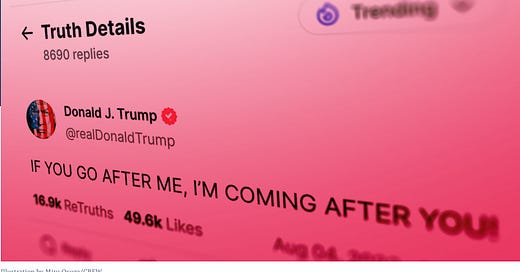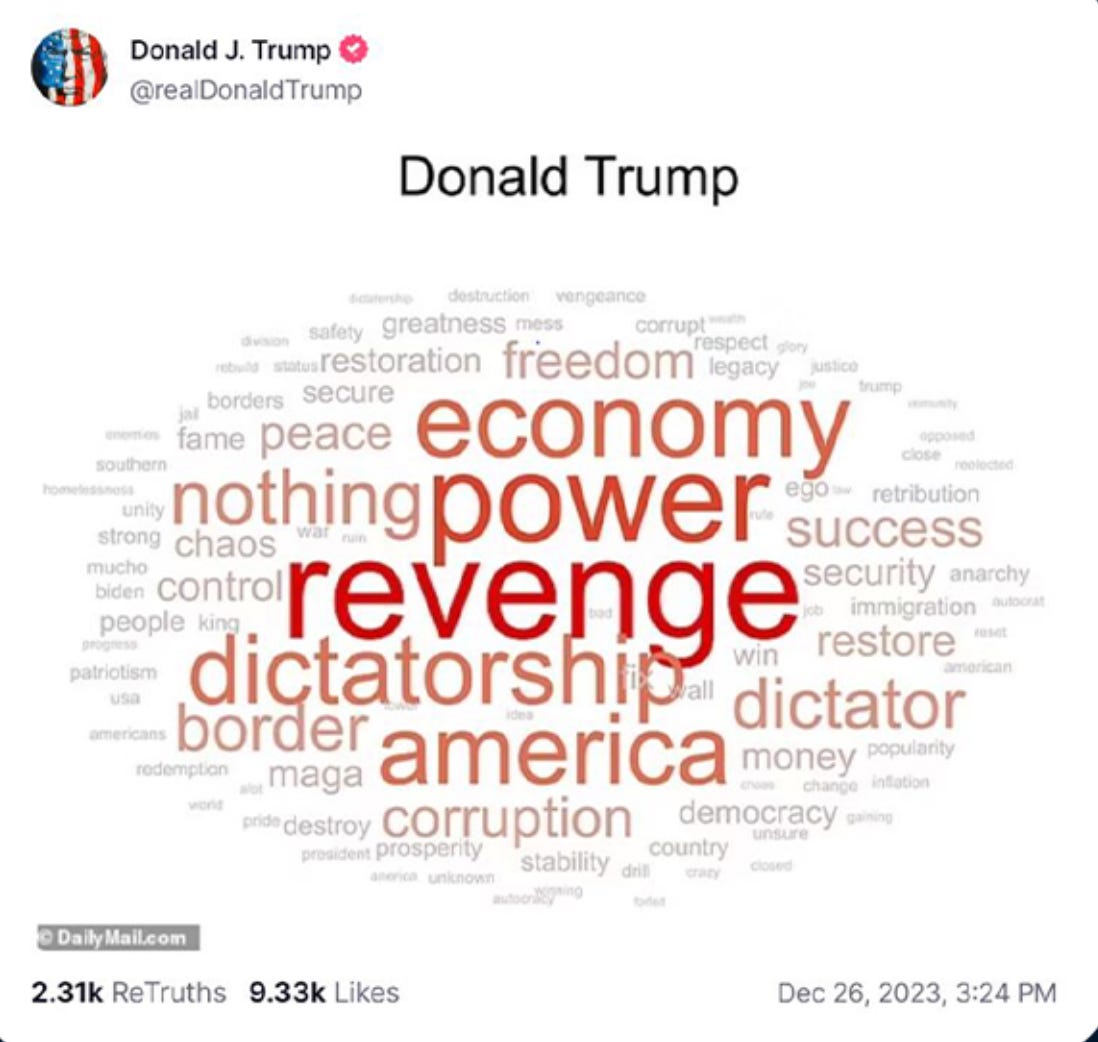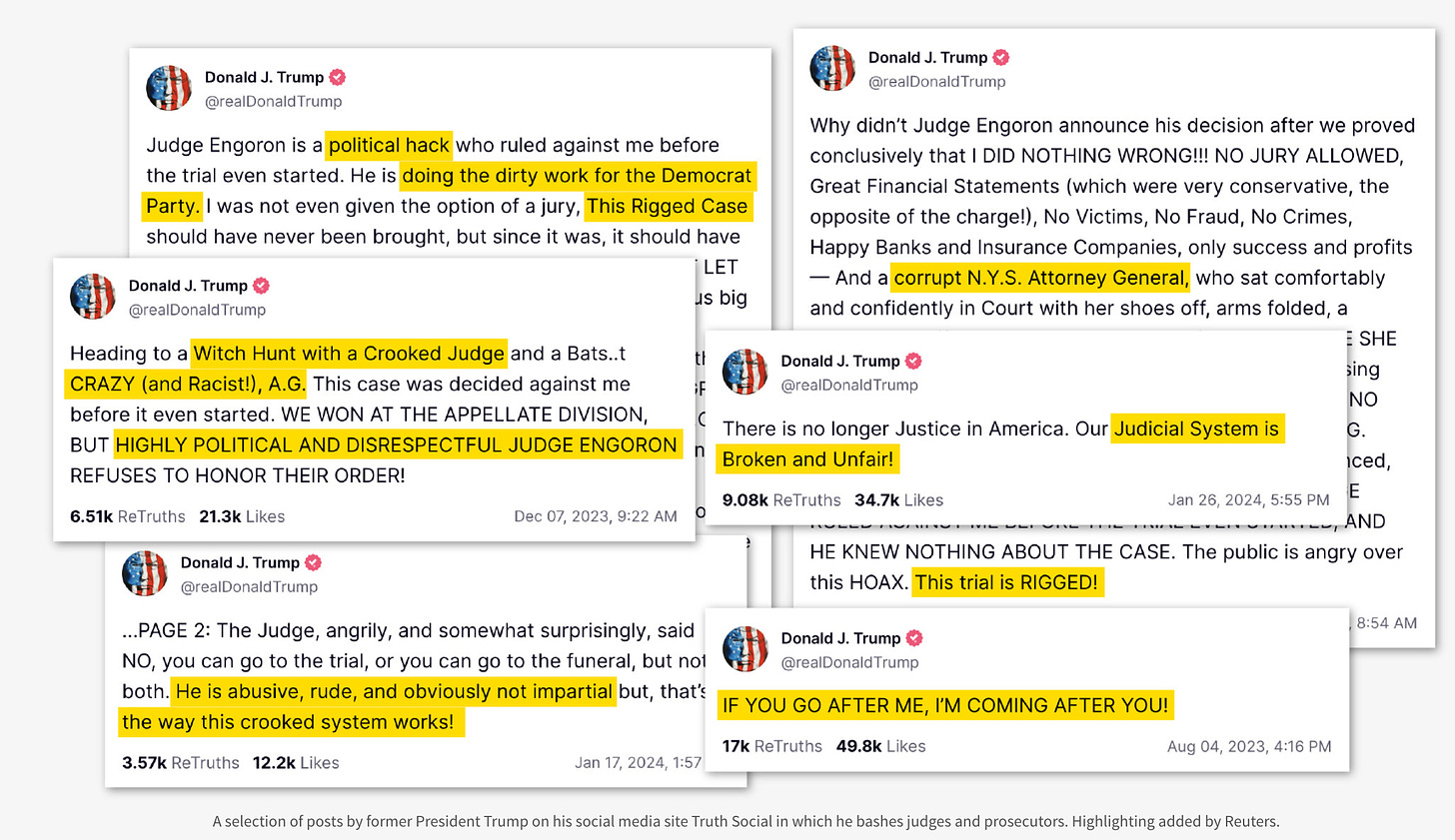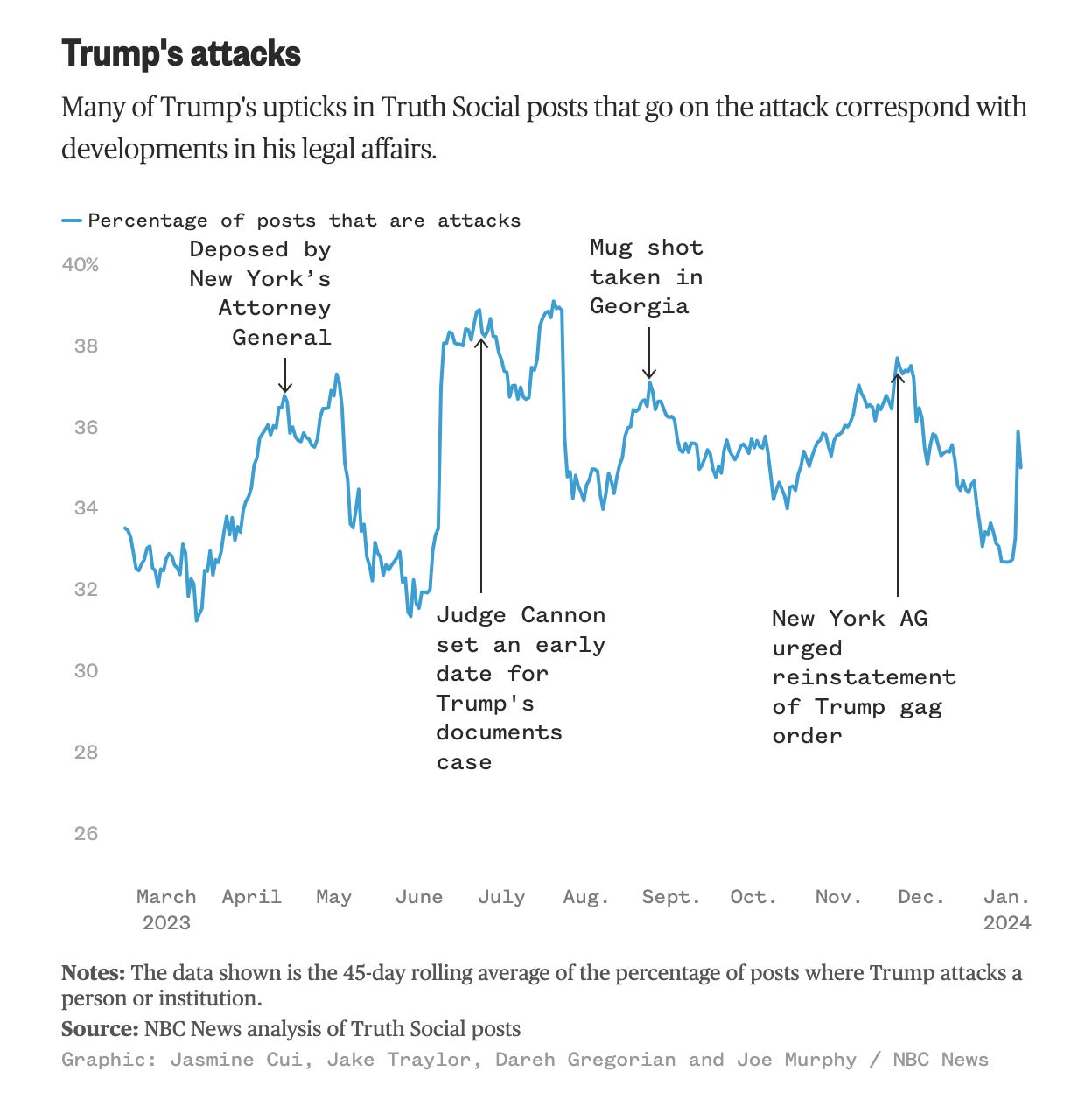The Future is Terror
Trumpism ushered in an era of threats, intimidation and retribution. It is getting worse.
Robespierre, a central architect of the French revolution, may seem like an unlikely reference point for modern American politics, and Donald Trump in particular. But in one way he articulated a theory of governing that Trump is enacting today:
If the basis of popular government in peacetime is virtue, the basis of popular government during a revolution is both virtue and terror; virtue, without which terror is baneful; terror, without which virtue is powerless. Terror is nothing more than speedy, severe and inflexible justice; it is thus an emanation of virtue; it is less a principle in itself, than a consequence of the general principle of democracy, applied to the most pressing needs of the patrie [homeland, fatherland]
Trump won’t use the word terror in such a way. But when he labels his opponents to be enemies of the people, fulminates against the deep state, and declares “I am your retribution” the ethos is the same. Set aside how much the retribution is driven by his interests, versus those of his supporters. The key point is that Trump has normalized retribution as a proper scope of presidential action and the use of political power. Terror becomes the perverted populist funhouse mirror of patriotism.
Far more than his first and second campaigns, Trump has made vengeance the central theme of his re-election platform, even reposting an wordcloud analysis of his campaign speeches that highlighted this theme.
Trumpism hastened a new version of right-wing politics, one that is not conservative nor libertarian in a meaningful sense, but one that urges the embrace of state power to go after their movement’s perceived enemies.
Terror is chiefly directed towards public officials who stand in the way of Trump’s goals and interests. These include other politicians, educators, public health officials, election officials, judges, and other parts of law enforcement.
In recent testimony, Anthony Fauci discussed how even a year after leaving the public sector, he has to maintain a permanent security detail shadowing him, given credible death threats against him and his family. Here is an example of of a threat that election officials, who lack such security protection, are routinely receiving:
The entire nation is coming for you. And we will stop, at no end, until you are in the ground. You’re a traitor to this nation. … You just signed your own death warrant. Get your affairs in order, cause your days are very short.
The examples are scattered, but too numerous not to see a consistent pattern.
A survey by the National League of Cities, found that 8 of 10 local elected officials reported experiencing harassment, threats and violence, while 9 out of 10 see the situation as getting worse.
A Princeton review of threats against local officials found that death threats are the most frequent type of threat recorded, representing 58% of all threats. The most frequent form of harassment was an invasion of privacy, which includes doxing, stalking, targeting friends or family members.
In 2021 there were no bomb threats reported by members of the American Library Association. In 2022 there were two. In 2023 there were 32.
Almost four in ten of local election officials report threats, harassment, or abuse, more than one in two worry about safety of colleagues and staff, and three in ten worry about the safety of families and loved ones.
The US Marshals service has reported a massive increase in serious threats against federal judges between 2021 to 2024, as Trump’s legal woes escalated. The head of this unit notes that “we would see a noticeable uptick in threats directed at whatever judge had the case” when Trump was in court.
I could go on with more examples, but I want to consider the implications for the future of terror becoming an ongoing feature of American political life, one that is especially targeted at public officials. There are eight lessons that stand out.
Lesson 1: Terror is Used to Subvert Legal Accountability
When Senate Republicans refused to indict Trump for encouraging a mob to storm the Capitol in a bid to intimidate public officials into overturning the election, they promised that the legal system would hold him accountable. The problem is that the legal system is deeply wary of Trump’s ability to intimidate public officials.
The FBI petitioned a judge to stop Trump from lying that its employees were ready to use lethal force against him. This is not an unreasonable concern on the part the FBI. After the Mar-A-Lago raid, a Trump supporter wrote on Trump’s social media platform wrote “Violence is not (all) terrorism. Kill the F.B.I. on sight” before attempting to do precisely that at a FBI field office. Right-wing media then printed the names of the FBI agents.
Within the space of a couple of weeks, three officials who challenged Trump in some fashion in court were victims of swatting: the Maine Secretary of State who sought to remove him from the state ballot, the judge presiding over his election interference case (who was placed under 24-hour protection), and special counsel Jack Smith. In Colorado, state supreme court justices that ruled that Trump should not appear on the state ballot faced four “swatting” attempts. Another judge in a different Trump case faced a bomb threat. The family of Michael Cohen, a key witness against Trump, was doxxed.
Trump had attacked them all. It is part of a broader pattern of threats directed towards people involved in the legal system. The fact that a jury found him guilty occurred despite the shadow of intimidation, where Trump supporters have tried to dox them and issued violent threats, is a somewhat remarkable affirmation of the fearlessness of citizens.
Judges, including Republicans, directly point to Trump as the reason for the wave of threats they now face. One former Republican judicial appointee and Ohio State Supreme Court Judge said that Trump “gave permission by his actions and words for others to come forward and talk about judges in terms not just criticizing their decisions, but disparaging them and the entire judiciary.” Another Republican-appointed federal judge took the extraordinary step of going on CNN to denounce the threats, after Trump had attacked the daughter of another judge: “if we don’t have a viable court system that’s able to function efficiently, then we have tyranny.” (A Trump supporter then filed an ethics complaint against the judge in order to “send a very clear message” to judges who speak out about Trump’s role in feeding intimidation).
Lesson 2: Terror Provides a Means of Control Over Officials Trump Has No Authority Over
Terror provides a basis of control over individuals that Trump has no direct authority over using tools such as intimidation or outright threats. Just as Robespierre and other authoritarians could call upon “the people” and assume that militant supporters would act, Trumpism out-of-office has looked to non-democratic tools to reshape politics and regain power. Many of his targets are state or local officials (such as judges and election officials). An analysis by NBC news shows that Trump strategically times his social media attacks on judges or agencies when they seek to hold him accountable for wrongdoing.
This gives Trump an extra lever of influence over these officials since he knows his followers will respond with more overt threats of violence. Trump can make allusions to his ability to call upon terror as a bargaining chip, such as his claim that it would be a “breaking point” for the public if he received any meaningful sentence for his conviction.
Lesson 3: Terror Will Be a Feature of American Public Life Regardless of The Election Outcome, But Worse if Trump wins.
Trump has primed his supporters and much of the Republican Party to refuse to accept that any electoral loss is legitimate. Searching for alternative explanations involves conspiracies, which requires vilification of election officials, judges or other parts of the “deep state.”
While Trump losing will feed conspiracy mongering and intimidation, it is, I believe a lesser threat than Trump winning, which will marry informal terror and state power. Trump has repeatedly shown a willingness to use state power to punish his perceived enemies, and has primed a second administration of lackeys willing to do so. For example, Trump allies have prioritized using federal law to prosecute Alvin Bragg, for prosecuting Trump. Even if such as case does not end up imprisoning Bragg, the point is to create a sense of fear to discourage any officials from pursuing Trump.
Trumpism has normalized abuses of state power by treating efforts to hold Trump accountable as outrageous. Stephen Miller, one of Trump’s most trusted advisers, asked: “Is every House committee controlled by Republicans using its subpoena power in every way it needs to right now? Is every Republican D.A. starting every investigation they need to right now?” Some are doing so. For example, Jim Jordan has targeted misinformation researchers with subpoenas, which in turn makes universities think twice about whether they want the political headaches and legal costs of such research. “The people that benefit from the spread of disinformation have effectively silenced many of the people that would try to call them out,” said Kate Starbird, one of the researchers targeted.
We have not seen what a full press of government resources could do to threaten dissenters into silence. Trump expressed a willingness to invoke the Insurrection Act, use the IRS to investigate his enemies, and remove any independence from the Department of Justice and their prosecution decisions. Former intelligence officials believe it is highly plausible that Trump will turn intelligence agencies on his political enemies.
Lesson 4: Trump and Others Have Created a Culture of Permission for Terror
Trump has pledged to pardon January 6 rioters convicted of crimes. Half of the judges overseeing January 6 trials have reported increased threats and harassment, and the mother of a police officer assaulted by rioters was swatted after the officer labeled Trump as an authoritarian. In recent weeks, Governor Greg Abbott pardoned a man who talked about killing anti-racist protestors, and then did exactly that.
Such actions create a permission structure that those who seek to impose terror will be protected from the consequences. For example:
One Jan. 6 defendant who already served time in prison for his role in the Capitol attack also weighed in on X, posting a photo of [District Attorney] Bragg and a photo of a noose. “January 20, 2025 traitors Get The Rope,” he wrote, referring to the date of the next presidential inauguration.
Lesson 5: Trump Is Teaching Terror To Others
Trump’s approach to terror has two mechanisms. One is to inspire supporters. Trump merely has to criticize someone to put them under threat. But Trump is inspiring terror in another way, which to legitimize it as a tool of politics and governing. Trump attacks not just public officials and journalists, but members of the public who disrupt his narrative. A peculiarly Trumpian category of social media celebrity that mimics this approach is the stochastic terrorist. LibsofTikTok, whose real name is Chaya Raichik, is a good example. Her posts of educators, librarians, physicians or, uh, gyms that she judges to be too friendly of LGBTQ+ issues trigger threats, including bomb threats, often causing significant disruption operating while those threats are being assessed. Trump hosted Raichik at Mar-A-Lago.
Lesson 6: Authoritarian Regimes Depend Upon Threats to Enrich Themselves and Maintain Power
In a political system where money is a legal and unlimited way to curry favor, campaign donations could effectively become protection money. For example, Trump told oil executives that it would be in their interests to donate $1 billion to him at a fundraiser. Such extortions might be legal, but they blur the line between fundraising, on the one hand, and a combination of corruption and threat on the other.
Tom Edsall quotes Samuel Issacharoff, a professor of constitutional law at N.Y.U.:
Trump governs in a swirl of corruption and intimidation. Everyone knows this and understands that in such regimes, proximity to power is key to government largess. In oligarchic regimes we see this in the sheer population concentrations in the capital city. Here, aspirants flock to Mar-a-Lago.
Stable democracies rely on institutions. Fragile democracies have poorly formed institutions. Unfortunately, the new populist wave sees the unwinding of institutions in favor of personalist rule. One cannot afford to be distant from the heart of power when perks are doled out on a one-by-one basis by cronies of the top commander of the country.
Lesson 7: Under Terror, The Quality Of Government Will Decline
Public sector work is a bundle of pluses and minuses. In its current format, it is attractive to people who favor stable work, and have high public service motivation. But in the context of politicization and terror, many of those people will leave. And who will replace them? In general people with less qualifications and dedication (since you are drawing from a narrower candidate pool), and in some cases, those people who believe in the conspiracy theories that has given rise to threats.
The quality of public services will decline. If you want to see a microcosm of this in action, look at Republican election officials who are being forced from their jobs for following the law and telling the truth.
Lesson 8: Most of Us Will Not Resist Terror
The fearful hypocrite becomes a more prominent character in political life under terror. Members of the Republican Party, right wing media, and business interests who once denounced Trump now embrace him or remain silent. Some privately express concerns they will not attach their names to when talking to reporters.
It is easy to be disgusted by such hypocrisy. But this is not just opportunism. It is partly fear. These officials generally can’t afford to spend the hundreds of thousands of dollars that Mitt Romney spent on security. They are aware of Trump’s comfort with using public power to engage in retribution.
They are also a preview of how most of us, including those who hold no affection for Trump, will behave when we have to consider if they want to be publicly attacked for saying the wrong thing, if we worry about our addresses being put online in a society where guns are more plentiful than people, if we don’t want our family to be singled out for our actions.
Living in fear is traumatic. Under terror, most of us wilt. That is why it is so effective.
Faced with such harassment many will choose to withdraw, or more carefully manage their statements and actions. They will prioritize physical and psychological safety over doing what they believe to be the right thing. Such a decision may be understandable from an individual perspective, but it is a disaster from a collective point of view, since it implies that public officials will be too scared to tell the public the truth.
We could observe some ironies here. We are told we have survived peak cancel culture, with many elite commentators comparing wokeism to the Chinese cultural revolution in its excesses. That this narrative has occurred during a rise in the use of terror and intimidation in American political life, but has excluded it from consideration, is remarkable. And in many cases the exclusion was deliberate, intended to help those who would truly soak our society in fear.
I suspect that Trump and his followers would embrace the label of revolutionaries: they imagine themselves unjustly persecuted and are bent on upending the old order. Extreme action is therefore justified. But Robespierre, for all of his authoritarian excesses, at least saw terror as serving a laudable end purpose of “virtue” — which included allowing ordinary people a greater role in fighting inequality and determining the conditions under which they lived. In MAGAland there is no virtue beyond loyalty to Trump. Terror serves only to reinforce that loyalty, drowning out appeals to virtue. Trump has simplified Robespierre’s aphorism to “the basis of popular government during a revolution is terror.”








This is a great summary of what's happening. It's also telling that the Republican Party stands behind this man and many even engage in similar terror. This is the same behavior behind any threat of violence and any form of violence - control. It's the same behavior we see around the world. Voting has never been more important and more necessary.
I'm watching Narcos, an old series on Netflix about Pablo Escobar, the Colombian drug lord who terrorized his country in the '80s. I cannot help noticing similarities between his narcissistic, psychopathic behavior as depicted in the film and Trump's behavior as a politician. Neither could do much without loyalty of a few morally bankrupt hired guns and a lot of willfully blind citizens. Another haunting example is provided by Hannah Arendt's 1951 book The Origins of Totalitarianism, which could be a playbook for Trump's followers. It describes in detail strategies used by Hitler and Stalin; both relied heavily on systematic lying and dissemination of nonsense in their rise to power.